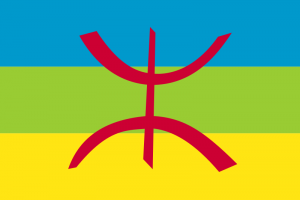Language/Standard-moroccan-tamazight/Grammar/Regular-Future-Tense-Verbs
| ◀️ Ait Lakhder Cherry Festival — Previous Lesson | Next Lesson — Irregular Future Tense Verbs ▶️ |
In this lesson, we will cover the regular future tense verbs in Tamazight. Future tense verbs are used to talk about actions that will happen in the future. It's an essential part of communication, and mastering it will help you to express yourself accurately.
To form the regular future tense in Tamazight, you need to use the prefix "gha-" before the verb root. Then, you add the corresponding subject pronoun suffix.
Here is the formula:
gha- + verb root+ subject pronoun suffix
Let's take the verb "suf" (to learn) as an example:
Consider exploring these related pages after completing this lesson: Questions & Possessive pronouns.
| Tamazight | Pronunciation | English |
|---|---|---|
| gha-suf-i | ɣa-suf-i | I will learn |
| gha-suf-ak | ɣa-suf-ak | You will learn (masculine singular) |
| gha-suf-at | ɣa-suf-at | You will learn (feminine singular) |
| gha-suf-aw | ɣa-suf-aw | He/She will learn |
| gha-suf-awn | ɣa-suf-awn | They will learn |
As you can see, the subject pronoun suffixes are the same as the ones used in present tense verbs. They are:
- i (for "I") - ak (for "you," masculine singular) - at (for "you," feminine singular) - aw (for "he/she") - an (for "we") - awn (for "they")
Now, let's look at some examples:
- Gha-tgoul-i s yidir: I will tell Yidir
- Gha-nuɣal-aw zzit: They will make oil
- Gha-dmiren-at tatrin: You (feminine singular) will cook tagine
It's important to note that the regular future tense verbs in Tamazight are the same for all three verb types (-ar, -ir, and -ur).
That's it! You now know how to conjugate regular future tense verbs in Tamazight. Practice as much as you can to get a good grasp of the language.
- gha-tɛlam (you will learn!)
- gha-ttidir (he/she will come!)
- gha-nuɣal (we will make!)
Remember that learning a new language is not just about grammar and vocabulary. It's also about understanding the culture and the people who speak it. So, immerse yourself in the Tamazight culture as much as you can. Listen to Tamazight music, watch Tamazight shows, and most importantly, practice with native speakers.
Other Lessons
- Basic Sentence Structure
- Regular Past Tense Verbs
- Plurals
- How to Use Be
- Future Tense
- Verb have in tamazight
- Masculine and feminine nouns
- Present Tense Verbs
- Give your Opinion
- Nouns
| ◀️ Ait Lakhder Cherry Festival — Previous Lesson | Next Lesson — Irregular Future Tense Verbs ▶️ |

